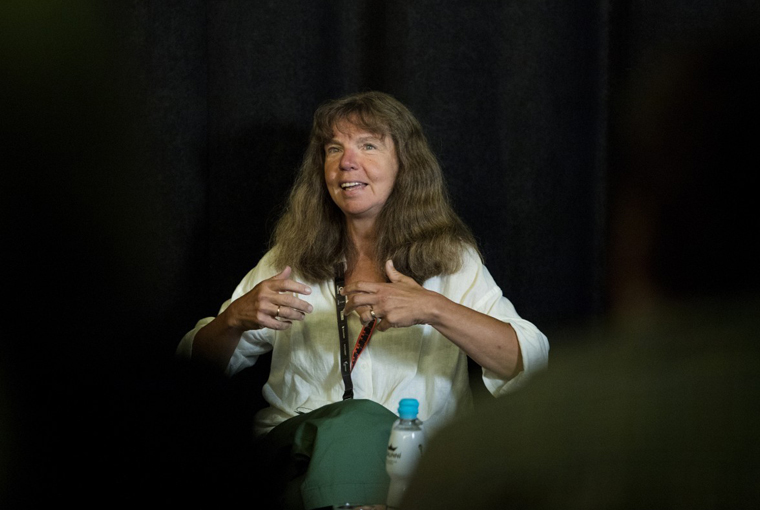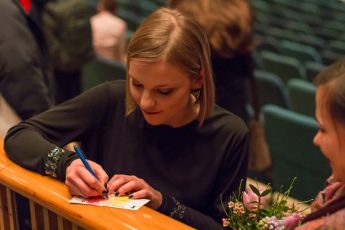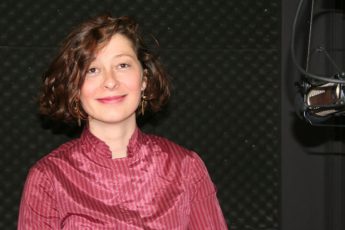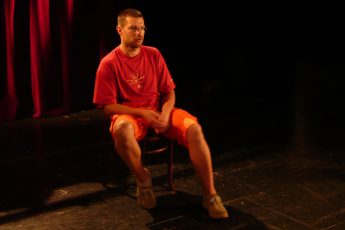
We met Latvian filmmaker Laila Pakalniņa at the Karlovy Vary International Film Festival (June 28-July 6), where her latest film “Spoon” was part of the documentary competition. Pakalniņa discusses the approach to and rhythm of her project, and shares her thoughts on the need to disappoint.
Why did you choose a spoon as the title-giving subject of your film?
Of course I could also have chosen a fork, but I think that the form of a spoon is a very nice symbol. During the shooting I realized that I had made the right decision in choosing the spoon, because it’s also very nice graphically but, at the same time, a spoon is kind of a symbol of all plastic cutlery. So are forks and plastic bags or whatever, but there’s something nice about a spoon.
There’s also something very satisfying about the word “spoon”….
Yes, it sounds nice in every language. It’s “lžička” in Czech, right? In Latvian it’s “karote”. The word somehow represents its form, so I think it’s a nice title for a film.
Definitely. Making a spoon is such a big process, so how did you start with your research?
First of all, I understood that we weren’t going to make some kind of educational film about the process. Of course, the idea was to show this complicated process and compare it to the short moments a spoon is used before it’s thrown out. But my idea was not to give an educational explanation of this whole process of the oil industry, and how from oil you get LPG, and then from LPG you get the plastic. I just needed the basic story of the creation of the spoon. Our research was more research into locations, because I understood that there were a lot of things that would not be possible to show in the kind of film I wanted to make. There are a lot of things happening in a hidden way, like in pipelines, and you can’t see those chemical processes. The only thing you can really see is when they are making the spoons from the plastic, which is what happens in China. This you can see, but the rest is not so easy. And then I understood that we will want to make compositions in different places where this process happens, and we will wait and shoot whatever happens in this frame, in this composition. If there will be people walking, then we will film them. If there will be animals, we will shoot them…
So this is how we developed this idea. Of course, we could do some limited research in Latvia, but there’s no oil in Latvia, so we could just research our style, and how we wanted to shoot. During the development process, we just went out to shoot some cisterns, and in fact those development shots ended up in the final film. We understood that that was how we wanted to shoot our film, and we went to certain locations for research, but only if we could. For example, we went to do research in Norway first and then we came back again to shoot, but of course in places like China we could only go to shoot once. We were researching by shooting.
Were there any places you weren’t able to access because of permission issues?
Of course. Not just places, but I would say whole countries. As soon as you start to speak about what you want to shoot, and as soon as they hear a connection with oil, it becomes difficult. But it’s not like I’m missing any parts in the film in the end. For example, our first intention was to shoot a spoon factory in Vietnam, but it was too complicated. At first they said they don’t have spoon factories at all, which is a lie. Then the second thing was that to shoot a documentary in Vietnam – at least this is what we were told – you need to write a precise script, which you need to follow while they supervise you. It’s impossible in a case like ours, because how are we supposed to write a very precise script if we don’t know what the thing we’re filming looks like? It’s a documentary film, we just put the camera somewhere and things happen. So since we couldn’t go to Vietnam, we went to China… I also wanted to go to somewhere like Iran or Qatar, but, again, I couldn’t find a way to get permission. So we went to Azerbaijan since they also have pumps for oil.
Since you decided not to follow the process sequentially, how did you determine how to structure the film as a whole?
It wasn’t rational at all. It happened in the editing and it is very much rhythm-based, but also constructed according to the image. I could use the word “formal”, which I mean in a positive way. We were following the form. I realized that I would edit the first big part of the film not by following the process step by step, but rather I would show the steps happening simultaneously. Everything happens at the same time, so we can’t separate all the huge logistics, including the ships and trucks, from the factories, since it’s all happening simultaneously. So the first part was edited in a way that everything’s happening at the same time. The only thing I left to the end was the birth of the white spoon – I kept the actual spoon until the last part.
It’s clear that the rhythm is very important and the music plays a big part in that. How did you work with your composer, Malika Makouf Rasmussen?
It’s always different. The thing is that I don’t use music very often because I find that music is always very manipulative. Music leads you and tells you what to think. But in this case, we wanted music to be really integrated in all the sounds so that the music is not separate. At first, we edited almost all the sounds and then we sent them to the composer. We had a lot of discussions and we showed her the particular places where we needed music. It was a long process, and in the end I think you can’t tell what’s music and what’s part of the sound.
During the premiere in Karlovy Vary, you said that you thought that the audience would be disappointed by the film. What did you mean by that?
Of course, it’s partly a joke, but at the same time it’s kind of my mission – to disappoint the audience. Maybe it’s somehow related to our Western culture, and I include myself in that. When I come to a film, I already know what I want to see and I judge it according to my understanding of what is a good film and what is a bad film. In this way, when you have a film called Spoon that’s about plastic, everyone creates their own film already and inevitably my film is different to what they imagine. I had a different experience in Asia though. For example, I was showing my film in Korea and I found a completely different kind of audience there, because they came like a blank sheet. They are ready to perceive whatever you show them – they’re really open to what it is you have to show. So that’s why I’m saying I’m going to disappoint you, because it’s not what you expect. Maybe it’s sometimes a good thing and sometimes a bad thing, but I think overall my mission is to surprise – to disappoint and to surprise.
Thank you for the interview.




Leave a Comment